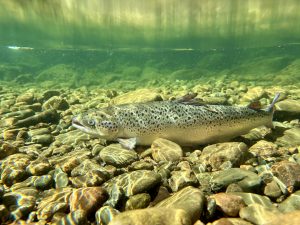14.8 billion meals. 121,000 jobs. $10 Billion (USD) annual production.
That’s what salmon farmers globally produced in 2012-13 from only .00008 per cent of the world’s oceans (262 sq km), according to a new report released by the International Salmon Farmers Association.
For an industry that didn’t exist only 40 years ago, that’s quite a success story.
And what province was and continues to be a pioneer of this innovative, global industry?
New Brunswick.
Too few New Brunswickers realize this province’s role in the development of the global salmon farming industry and the depth of the expertise and specialized aquaculture knowledge that exists here in our province and our region.
Our salmon farmers helped launch and build this industry. Today, two privately-owned Charlotte County family businesses produce upwards of 50 per cent of all the salmon in North America, and they’ve done that while facing stiff competition from publicly-owned, multinational companies.
Our province also boasts: highly skilled engineers and specialists in the design and retrofit of Recirculated Aquaculture Systems (RAS) for fish hatcheries; veterinarians who are experts in fish health and aquatic sciences; scientists and innovators who are leading in fish feed development, environmental monitoring, net production and innovative farming practices.
It’s not overstating it to say these people are world-class experts in their fields.
They are also people who have shared working waterfronts with traditional fishermen and tourism operators since the industry began. They work with their friends, neighbours and colleagues in these other sectors to get investment in infrastructure like wharves, to promote the region’s quality seafood to buyers from around the world, to invest in research and to cooperate on award-winning projects such as the Inner Bay of Fundy Salmon Recovery Project.
Such world-class expertise and industry collaboration should be a source of pride for New Brunswick as well as a vital asset in a diversified economy as our province attempts to move forward amidst unprecedented financial challenges.
The International Salmon Farmers Association’s recent report – entitled Salmon Farming: Sustaining Communities and Feeding the World – outlines key statistics about the world’s growing population and points to the need to find innovative ways of growing healthy food during a time when the world’s land and fresh water resources are shrinking. It also demonstrates that salmon farms today thrive in coastal communities, producing one of the healthiest foods with a minimal environmental footprint. The report points to Charlotte County as an example of what salmon farming can do for a coastal community.
Rick Doucet, New Brunswick’s Minister of Agriculture, Aquaculture and Fisheries, attended the report’s launch at Seafood Expo North America in Boston.
“I see first-hand how salmon farming is transforming my own community. Lord’s Cove in Charlotte County, NB was the site of Canada’s first commercial salmon harvest. Over the past almost 40 years, our local salmon farmers have built the industry in this region into an economic powerhouse that creates 1,600 jobs in my area alone,” Doucet said. “This report illustrates how vitally important salmon farmers will continue to be in meeting future demand for quality food. We in Atlantic Canada have a unique opportunity to play a very positive role in continuing to build a responsible industry that brings jobs to our communities in the future.”
He’s right.
The need for food is growing; land and fresh water resources are shrinking; and, farming the ocean is crucial to help supply healthy protein for future generations. Our region has an abundant natural ocean environmental that provides optimal conditions for growing farmed fish in an environmentally sustainable way. We have local companies wanting to invest in the industry in their own region. We have dedicated and hardworking people who want to continue their family’s centuries old tradition of working on the water. And we have the science and technical expertise to continue our pioneering tradition in this sector.
Salmon farming has clearly come of age and coastal communities around the world, including in our region, are well-positioned to benefit from the growing demand for this healthy food. Salmon farming is already one of this region’s biggest economic drivers, employing over 3,000 people in New Brunswick and Nova Scotia and generating $356 million economic activity locally.
The opportunity exists for our industry to create even more economic prosperity in our province through innovation and technical advancements.
This much is certain: Our people are our strength. Their pioneering spirit, determination, work ethic, innovation and collaboration are a tremendous advantage to New Brunswick – one that we should not ignore.
